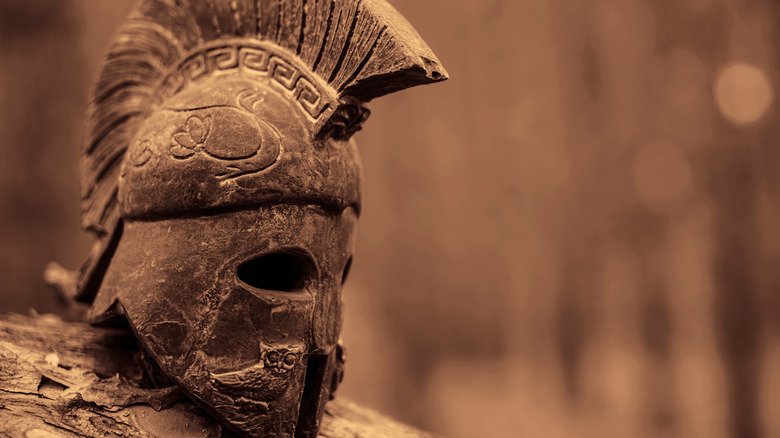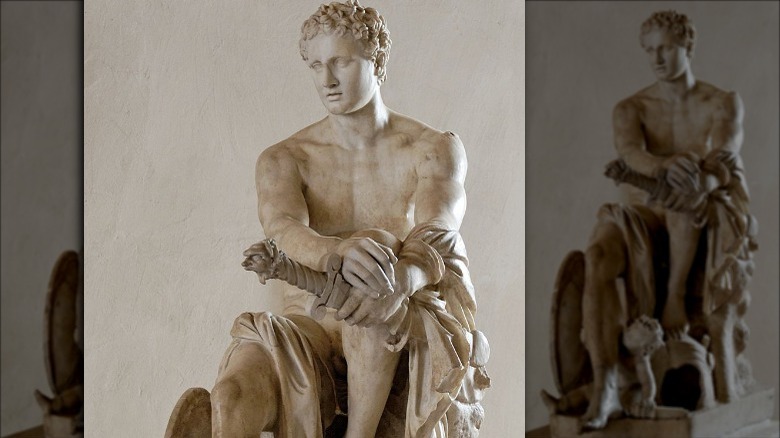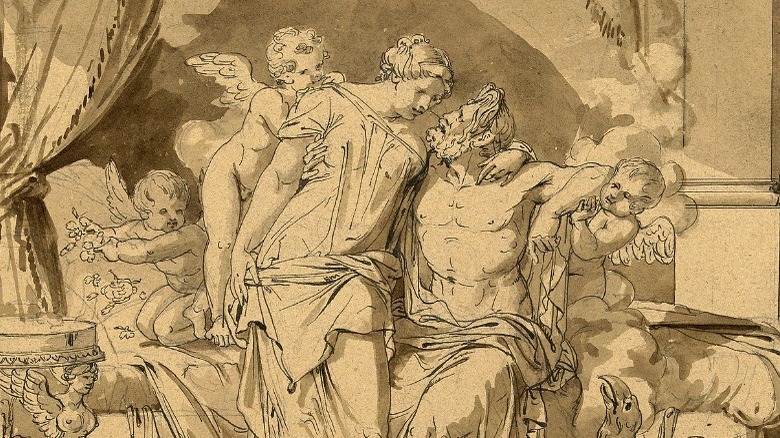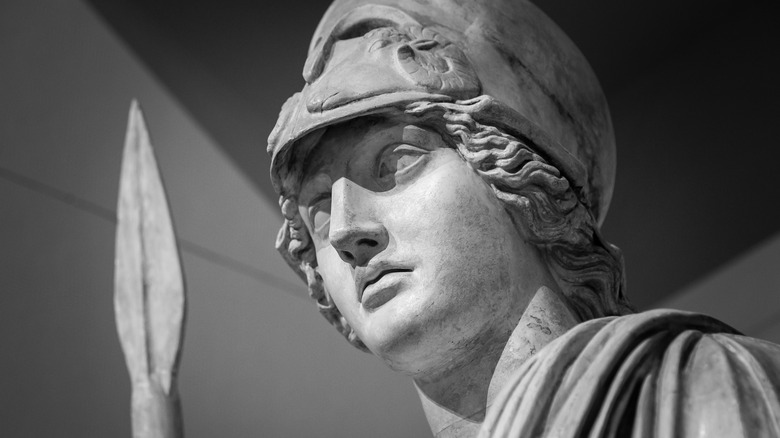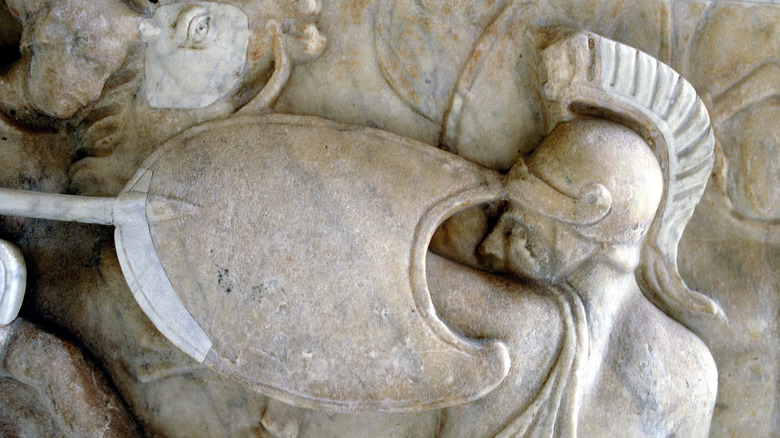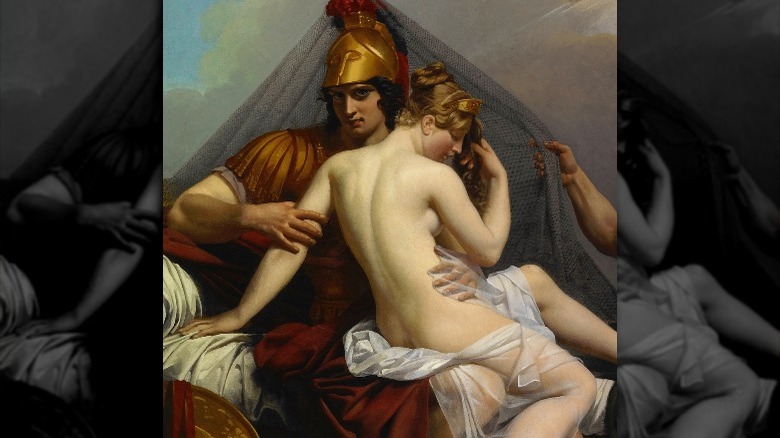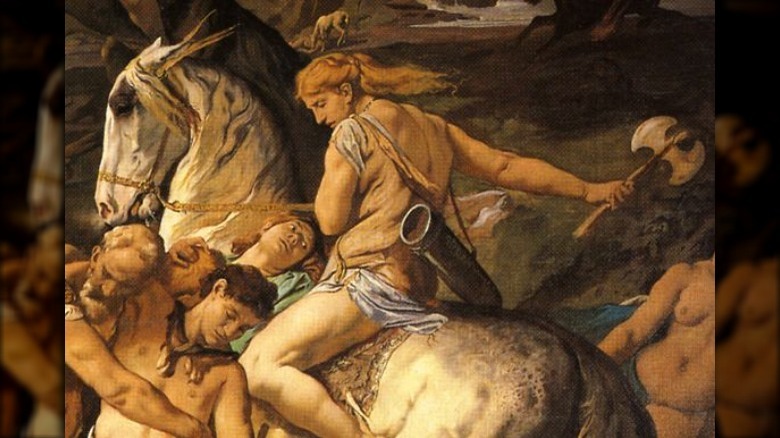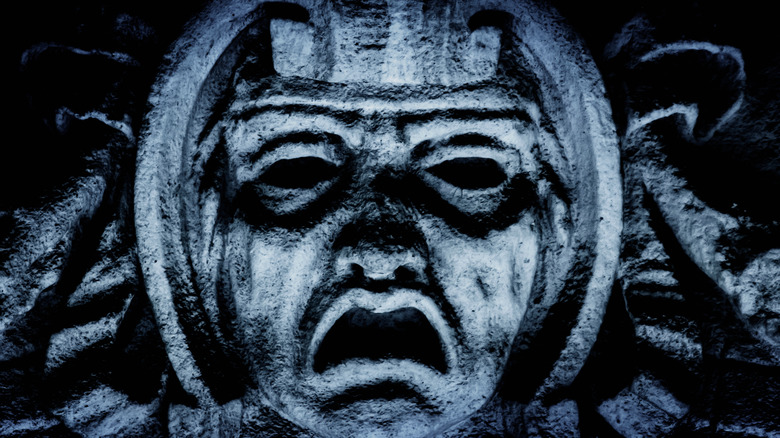The Mythology Of Ares Explained
Zeus and Hera may have had a ton of kids, but they only had a few together. Given his seemingly infinite number of affairs and illegitimate children and her rage over his constant infidelity, it's kind of fitting that together, they produced the god of war.
There's a little more to it than that, though. While war can arguably be righteous and necessary, that's not Ares. Theoi explains that he personifies the other side of war: brutal, horrible, bloody. He delights in the mass slaughter, plays both sides to see just how many people will die, and it's even better when he can get in on some of the gruesome consequences. Plague, famine, more death? The more, the better.
Here's the thing about Ares: When it comes to looking back at the ancient Greek and Roman (where he was known as Mars) imagery to get a glimpse at how Ares was portrayed, it's tough to identify for sure which images are actually him. He was often depicted as either a young man or a middle-aged man with a beard, and while other gods were shown with symbols that made them easily identifiable, Ares wasn't. Sometimes had a helm and a shield, but there was no particular symbol on the shield, and consequently, he ended up looking like just any old warrior.
That's left a pretty large hole in his mythology. So, what do we know about this most despicable of the pantheon? This is the mythology of Ares explained.
No one really liked Ares
When it came to being liked and respected, Ares was kind of on the outs: Ancient hymns say that even his parents had a deep dislike for him (via Theoi). In "The Iliad," Zeus says to Ares "To me you are the most hateful of all the gods who hold Olympos. Forever quarrelling is dear to your heart, wars and battles."
Not only was he brutal, but when push came to shove, he wasn't very good at what he did. He lost in confrontations with the other gods — particularly his sister, Athena — fairly often, and the lack of respect he was afforded by his fellow Olympians seems to have translated to the real world.
While temples to the more mainstream Olympians — like Zeus, Artemis, and Athena — could be found throughout the settled world, Ares was kept to the outskirts. Ancient World Magazine says that mainstream (i.e., "civilized") Greece viewed him as having a brutal, unpredictable, and savage nature, and he was associated with people who were viewed the same way.
Contemporaries like Herodotus and Euripides wrote that he was associated with Thrace — thought to be his birthplace — and the nomadic, horse-riding Scythians. It's a move that Mythopedia suggests was meant to separate him from the more traditionally Greek people, places, and values.
He was also worshipped in Colchis, and while there were smaller temples and statues dedicated to him throughout Greece, they were usually kept on the outskirts.
Ares has a strange family
For such a bloodthirsty guy, Theoi says he's got kind of a strange family. Ares is one of the relatively few children of Zeus and Hera, which makes his full sisters Eileithyia (goddess of childbirth, light, aid, and relief), and Hebe (cupbearer of the gods, and the goddess of young brides). His full brother is Hephaistos, and as the god of smiths, craftsmen, and fire, he's one of the good guys.
He also has a shocking number of kids, and while it's impossible to talk about all of them, there are a few who pretty perfectly illustrate the schism between his offspring. Some are expected: He's the father of the god of fear (Deimos), panic (Phobos), a war god (Enyalios), and he's also the father of a serpent called the Drakon Ismenios. The serpent was originally set up as the guardian of a sacred spring, but when it was killed by Cadmus, it was Athena who intervened and had the hero plant the serpent's teeth — which grew into warriors that became the city's founders. Cadmus, meanwhile, paid for his insolence when Ares turned him into a giant snake.
But strangely, there's another side to his family tree. Along with a slew of warriors, kings, and queens, he's also the father of Harmonia, goddess of harmony, the god of love Eros, and — according to some stories — he's also kind of ironically the father of Nike, the goddess of victory.
The difference between Ares and Athena is super important
Ares, according to Mythology Unbound, was pretty much a bloodthirsty maniac who fought with the goal of causing as much destruction and death as he possibly could. Two things resulted from that: He was widely known as the sort the Olympians didn't voluntarily invite around for dinner, and he was frequently bested in combat. His most embarrassing defeat might be when he was trapped in a pot by a few giants and had to wait for another one of the gods to rescue him, but he was most regularly put in his place by Athena.
In contrast to Ares, the beloved Athena was a goddess dedicated to war for a just cause, the protection of heroes and the Greek people, strategy, and wisdom. After emerging from her father Zeus' skull — fully grown and already armored for battle — she became known for favoring courageous heroes and righteous causes. In addition to becoming the patron goddess of Athens (by gifting the city olive trees), she became the goddess associated with heroes like Odysseus, Bellerophon, and Perseus.
During the Trojan War, Ares and Athena started out on the same side — the Greek side. However, Ares switched sides midway through, and when Athena went to her father and asked permission to take Ares out, it was granted. She absolutely did, and sent him running — and crying — to Zeus (via Study). The message is clear: There's a right way to fight a war, and a wrong one.
Ares is not just the god of war
Today, Ares is mostly thought of as the Greek god of war, but digging into the works of ancient writers like Homer, Plato, and Aeschylus shows that he was also associated with other traits — and most of them weren't good.
While "The Iliad" gives Ares credit for instilling the warriors of Troy with the courage and strength they need to go charging into battle, this battle prowess is fueled by bloodthirsty rage. Homer also described him as "Violent Ares, that thing of fury, evil-wrought," and Plato says those who follow him are so driven mad by a desire for revenge that they'll kill anyone in their path — even those they love. Ares' name also comes up in a discussion about Agamemnon's family and their gruesome slaughter of children, and according to Athenian law, he's also the god connected to murder and homicide.
It's not just warriors that gave him the nod as they headed into battle, either: Aeschylus wrote of the joy that he took in randomly killing travelers on the road, while Apuleius wrote that brigands, highwaymen, and thieves — the sort that would attack and pillage defenseless villages — would sacrifice to Ares, the god they viewed as one of their own.
Ares and Aphrodite... and Adonis
Ares may have been a bloodthirsty jerk, but he did have a soft spot for Aphrodite, the goddess of love. The story of their ill-fated romance has been pieced together from fragments discovered over the years, says Theoi, and it's tragic stuff.
It started when Hera was so embarrassed by her son Hephaistos that she threw him out of Mount Olympus. He trained as a smith, and in an attempt to get back into their good graces, he sent gifts to his family, including a golden throne that trapped Hera when she sat in it. Zeus asked Aphrodite to intervene with a marriage proposal to Hephaistos, and she agreed — thinking that there was no way the craftsman would best her beloved Ares in battle.
He absolutely did, and when he gave Ares quite the beating and married Aphrodite, the god of war and the goddess of love kicked off an adulterous, incestuous affair. It resulted in several children, but it was never anything but tumultuous.
Their relationship is filled with stories like that of the ill-fated Adonis, a beautiful young man who captures Aphrodite's heart. There are a few different versions of what happened to him, but according to The History Cooperative, Ares didn't take the news of their affair very well. Knowing that pair were going to be out hunting, Ares sent a wild boar after the young Adonis. He was badly gored and died in Aphrodite's arms, bringing an end to their affair and a start to festivals honoring his short — but beautiful — life.
Ares was the father of the Amazons
The Amazonians might be a tribe of all-female warrior women who forbid men from entering their ranks — or their home city of Themiscyra, located in what's now Turkey — but their roots go all the way back to not a goddess, but a god, says World History.
The first Amazon was a woman named Otrera, and she was the daughter of Ares and a nymph named Harmonia. (It's worth noting that this figure isn't the same person as Ares' daughter, also named Harmonia.) In the true style of the Greek Gods, Ares then hooked up with Otrera, who gave birth to several of the Amazons' greatest queens, including Hippolyta, Antiope, and Penthesilea.
The Amazon warriors show up throughout Greek mythology. Hippolyta, for example, appears up in the stories of the 12 labors of Herakles: For his ninth task, the Perseus Project says that he was sent to steal the belt of the Amazon queen. It was a gift from her father, Ares, and after hearing the story, Hippolyta agreed to give him the belt. Add in some interference from Hera, though, and the exchange ended in a massacre and the death of the Amazonian.
Ares's other famous Amazonian daughter, Penthesilea, met her end in hand-to-hand combat against Achilles during the Trojan War. Achilles is so impressed with her prowess in battle that he honors her with a warrior's burial.
Ares and the bandit prince
Ares had a slew of children, from divine to demi-gods to mortals. Not all of them went down the road of war, and some chose to honor their bloodthirsty father in other ways.
Kyknos was Ares' son by a woman named Pelopeia (or Pyrene), and he decided that the life of a bandit and outright murderer was the one for him. He ended up getting the attention of all the gods when he moved into an area of Thessaly and set up in a grove sacred to Apollo. It wasn't just a way to send a message to the gods — it also provided him with a never-ending stream of pilgrims to prey on. Creatively effective, maybe, but Hesiod wrote that it ended about as well as one might expect (via Theoi).
Herakles was on his way to steal the Apples of the Hesperides (via the Perseus Project) when he came across the grove, and while some versions of the story claim that Kyknos challenged Herakles, others say that Zeus himself gave Herakles permission (and a little extra muscle power) to go right ahead and kill Ares' troublesome son.
He absolutely did, and when Kyknos fell, that's when Ares showed up with hopes of avenging his son. Thanks to the interference of Athena, it was Ares who was wounded — so badly that his sons Phobos and Deimos had to come and rescue him.
Ares was all about the sacrifices
Ares might not have had the widespread love that some of his fellow Olympians did, but according to A Dictionary of Greek and Roman Biography and Mythology, he had his fans — and they really, really liked to make sacrifices to him.
Just what those sacrifices were varied by cult. The Thracians and the Scythians were the people perhaps most devoted to him, and the latter used a sword to symbolize him. Horses, cattle, and human sacrifices were all readily offered in Ares' name, and they weren't the only ones to slaughter humans for their god.
Unsurprisingly, there was also a cult of Ares at Sparta, where a statue of the war god showed him in chains. The idea was that his spirit — and all his bloodthirsty hunger — was forever connected to and present in every part of Spartan culture, and the Spartans offered up human sacrifices to prove how serious they were.
Ares wasn't just about leading his men into battle, and the sacrifices made to him reflected that in Tegea. After the women of the city joined in a battle against the Lacedaemonian king and secured victory with their attack, they regularly celebrated their triumph with an all-female sacrificial feast called the Gunaikoqoi.
Ares vs. Mars
The Roman equivalent of the Greek Ares is Mars. They're both portrayed with the same imagery, they're both strongly associated with war and conflict, and they both have a counterpart in the goddess of war: respectively Athena and Minerva. Mars hooked up with Venus just like Ares did with Aphrodite. But there are a ton of differences between the two gods, too.
World History says that Mars was much more of a level-headed, rational figure than his Greek counterpart. Instead of being pushed to the outskirts and lording over the lawless, he was the father of Rome's founders, Romulus and Remus, and was regarded as the city's protector.
Mythopedia adds that while Mars wasn't quite the wise tactician that the goddess of war Minerva was, he was also not as insanely destructive as Ares was. While Ares was known for kicking off conflicts for no reason other than bloodshed, war fought in the name of Mars was seen as necessary for clearing the way for peace. When Mars went to war, it was to settle conflicts with an end goal in mind, and to that end, he was celebrated for bringing righteous victory to Rome.
As such, he was one of Rome's Archaic Triad, with his father being the only god that rivaled him in importance. The months of March and October were dominated by his festivals and sacrifices, and while those were typically rams, bulls, and pigs, he was the only Roman god to be offered horses as sacrifices, too.
Ares was always associated with the planet Mars
Our solar system's famous red planet is, of course, named Mars, after Ares' Roman counterpart. So far, so good.
Space says it was the planet's bloody color that earned it a connection with the god of war, which makes sense. Mars has two moons, and they're named Deimos and Phobos. But Deimos and Phobos are the children of Ares, not Mars. According to Mythopedia, Mars also fathered the gods of fear and terror, but they were named Timor and Metus. Why not name the planet's moons after them?
Because, says Ancient World Magazine, the planet was called Ares for a long, long time.
The Homeric Hymns are a group of songs, with each one dedicated to a different god. The eighth is to Ares, and includes the verses: "Sceptred King of manliness, who whirl your fiery sphere among the planets in their sevenfold courses through the aether, wherein your blazing steeds ever bear you above the third firmament of heaven."
The hymns are attributed to Homer — who may or may not have existed — and they're generally dated to between the seventh and sixth centuries B.C. It's been suggested that the hymn to Ares is a later addition, but it's clear that the ancient Greeks had named one of the seven planets they knew of after their god of war. And that was Ares. While it was Mars to the Romans, it turns out that yes, naming the moons after the sons of Ares makes sense after all.
